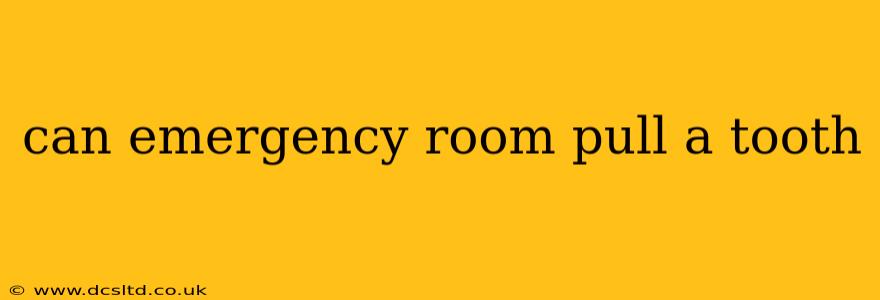Can an Emergency Room Pull a Tooth?
The short answer is: sometimes, but it depends. While emergency rooms (ERs) are equipped to handle a wide range of medical emergencies, tooth extraction isn't typically their primary focus. They're designed for life-threatening situations and immediate stabilization, not routine dental procedures. Let's delve into the specifics.
What Situations Might Lead an ER to Extract a Tooth?
An ER might extract a tooth in situations where it poses an immediate threat to the patient's health. These usually involve severe trauma or infection. Here are some examples:
-
Severe Trauma: If a tooth is severely damaged in an accident (e.g., a car crash or sports injury) and is causing significant pain, bleeding, or risk of infection, an ER doctor might remove it to prevent further complications. This is often a temporary measure until the patient can see a dentist for follow-up care.
-
Severe Infection (Abscess): A severely infected tooth (abscess) can lead to a life-threatening condition called cellulitis or even sepsis. If the infection is causing significant pain, swelling, or spreading rapidly, an ER doctor might extract the tooth to control the infection. This is usually a last resort, however, and antibiotics are typically administered first.
-
Loose Tooth Obstructing Airway: In extremely rare cases, a severely loose tooth might pose a risk of obstructing the airway, especially in young children. An ER physician might remove it immediately to ensure the child can breathe.
When Should You Go to the ER for a Tooth Problem?
It's crucial to understand when a dental emergency warrants a visit to the ER versus a dental professional:
-
Severe bleeding that won't stop: If you're experiencing uncontrollable bleeding from a dental injury, seek immediate medical attention in the ER.
-
Signs of infection (severe swelling, high fever, spreading redness): These are potential indicators of a serious infection and require prompt medical evaluation.
-
Difficulty breathing due to a dental injury: This is a life-threatening emergency requiring immediate ER attention.
-
Severe facial trauma: A significant injury to your face involving your teeth requires urgent care in the ER.
When Should You See a Dentist Instead?
For most dental issues, including toothaches, chipped teeth, or loose teeth not caused by severe trauma, seeing your dentist or visiting an urgent dental care clinic is the best course of action. They have the specialized tools, experience, and expertise for proper diagnosis and treatment.
Can an ER Give Me Pain Relief for a Toothache?
While the ER might provide pain medication to manage pain associated with a dental emergency, they won't address the underlying dental problem. The ER aims to stabilize the patient, not provide complete dental care.
Will the ER Bill Me for Tooth Extraction?
Yes, the ER will bill you for any services provided, including tooth extraction. ER visits and procedures are typically far more expensive than a visit to a dentist or urgent care dental facility.
In summary, while an emergency room can pull a tooth under specific circumstances, it's not their primary function. Most dental issues are best handled by a qualified dentist. Only seek ER care for severe dental emergencies that pose an immediate threat to your health or life. Always prioritize seeing a dentist for routine dental care and non-emergency dental issues.
